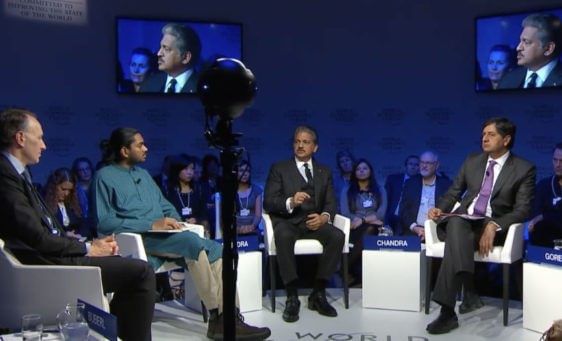
WEF: Mahindra challenges all companies to set science-based targets
Jan 30th 2018
Anand Mahindra, chairman of the Mahindra Group, is challenging all businesses around the world to set a science-based emissions reduction target ahead of this September’s Global Climate Action Summit in California.
Mahindra laid down the challenge at the World Economic Forum in Davos, whilst committing to set science-based targets for all the companies in the $19 billion Indian conglomerate.
“I am inviting all companies, particularly those that emit the most, to commit to set science-based targets,” Mahindra said.
“Over the course of 2018, I will be working to expand the adoption of science-based targets not only across the Mahindra Group, but amongst my business colleagues so that by the Global Climate Action Summit in September, 500 companies step up and commit to set science-based targets,” he said. Mahindra is co-chair of the Summit in California.
He sought to dispel persistent ‘myths’ about business action on climate change while speaking at the forum. “The first myth is that there is a trade off between choosing to do something that improves climate and your growth or your profits,” he said.
Mahindra pointed out that all of the company’s initiatives to reduce greenhouse gas emissions have generated a return, adding that “in the last five years for example we’ve saved 58 million KWh of energy, which could fire up 15,000 homes in India. That saved us money.”
Mahindra also said that: “Climate change is in fact the next century’s biggest financial and business opportunity… There is going to be a $6 trillion opportunity over the next two decades.”
Two Mahindra companies, those with the highest emissions – Tech Mahindra and Mahindra Sanyo Special Steel – have already committed to set science-based targets. Between now and the Summit, the Mahindra will be working with all of its companies to do the same.
More than 330 of the world’s biggest companies have already committed to align their strategies with the ambition of the Paris Agreement through the Science Based Targets initiative. Almost 900 more companies have declared their ambition to set science-based targets within the next two years, in their 2017 disclosures to CDP, signalling the emergence of a ‘new normal’ in the way businesses are developing their strategies for the future.
The Global Climate Action Summit, which will be held September 12-14 in San Francisco, will showcase climate action around the world from businesses, cities, states and regions, along with bold new commitments. This showcasing of climate action will help to give policymakers the confidence they need to go even further with their national climate plans when they meet for COP24 in November.
Mahindra’s challenge is the first of what will be multiple “Summit Challenges” that aim to accelerate greenhouse gas reductions at a rate that will ensure worldwide emissions start trending downward no later than 2020—a goal that must be met to prevent dangerous temperature rise. The challenge will also help the Summit deliver on its goal to drive a worldwide energy transition that generates quality employment and inclusive economic growth.
Scaling up momentum
Also at Davos, French President Emmanuel Macron committed to shutting down the country’s handful of coal-fired power stations by 2021, in a bid to “make France a model in the fight against climate change.”
Indian Prime Minister Narendra Modi highlighted climate change as one of the three most significant challenges to civilization as we know it, along with terrorism and the backlash against globalization.
And the release of The Climate Group’s RE100 Progress and Insights Report shows that by the close of 2016, 25 RE100 members had already reached 100% renewable electricity, including Autodesk, Elopak, Interface, Marks and Spencer and Sky.
Many more RE100 members are going further and faster in their transition to 100% renewable electricity, realizing the business benefits of doing so and helping to grow demand for clean energy. One of those companies is Nike, which recently signed its second major wind contract to take the company more than half way to reaching 100% renewable electricity globally.
Budweiser beer is soon to feature a symbol letting consumers know when the beer has been brewed using 100% renewable electricity. The move comes as parent company AB InBev, the world’s biggest brewer, works towards its RE100 commitment to source 100% renewable electricity worldwide by 2025.
Meanwhile, over 30 leading companies across 16 sectors joined forces to speed up the implementation of circular economy solutions through the World Business Council for Sustainable Development’s newest initiative, Factor10.
And the number of companies making bold climate commitments through the We Mean Business coalition’s Take Action campaign has reached over 660. This includes 339 companies either committed to set or with approved science-based targets and 116 committed to 100% renewable electricity through RE100, brought to you by The Climate Group.